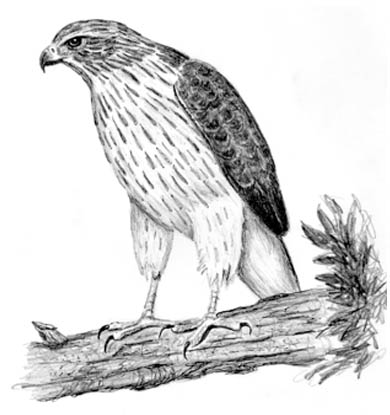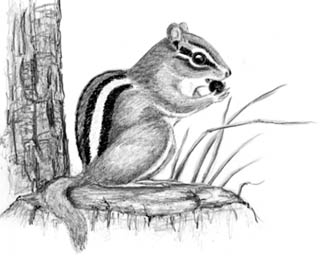
Dear Bird Folks:
I have a family of Cooper’s Hawks hanging out in my yard. They are putting on quite a show. We have been enjoying their antics, but now I’m worried about the birds at my feeder. Don’t hawks eat birds? My neighbor has taken to down his feeder to protect his birds. Should I do the same?
-Sue, Eastham
Never Sue,
Never take your feeders down, for any reason. I sell bird seed. Do you want me to have to take a second job? Do want my kids have to play used video games? With this fragile Cape Cod economy, this is no time to be cutting back on anything, especially birdseed. Birdseed is the engine that drives the world’s economy, or at least it does in my house.
Cooper’s Hawks eat an awful lot of birds. They’ll eat any bird from a dove on down, including our feeder birds. It is believed that the popularity of bird feeding has helped the Cooper’s Hawk recover from a sharp decline that its population suffered in the first half of the last century. Thousands of them were shot by the Frank Perdue wannabes, who thought that the hawks were eating their chickens, and they probably were. The hawks also died, like many other things, as a result of DDT. DDT not only effected the birds directly, but it also wiped out millions of songbirds, the hawk’s major food source.
Here on Cape Cod the number of Cooper’s Hawks has been increasing in recent years, perhaps to the point of squeezing out the similar but smaller Sharp-shinned Hawk. Once again it is possible that our feeder birds are a source of food for this opportunistic raptor.
Unlike many of the hawks that we see soaring above open fields, Cooper’s Hawks are birds of the woodlands. They have comparatively shorter wings and longer tails that allows them to maneuver quickly through the trees in hot pursuit of prey. It is the Cooper’s Hawk that is often responsible for the song birds that crash into our windows. The lightning quick hawk instantly grabs the unfortunate bird on the rebound off the glass and continues on. Occasionally the hawk isn’t quite quick enough and it too smacks into the window, creating an embarrassed hawk or worse.
Cooper’s Hawks have adapted rather nicely to the changes we have made to the landscape. Besides enjoying the yummy taste of feeder birds, Cooper’s will also use many of our shade trees as nest sites. They have no problems nesting close to our homes or buildings. Which finally brings us to the answer to your question Sue. Surprising, the family of Cooper’s Hawks in your yard poses little threat to the birds are your feeder. What? Isn’t that just the opposite of what I’ve been blabbing about for the past five paragraphs? Calm down, let me explain.
You would think after what I’ve just written that a Cooper’s Hawk nest would be about as welcome to a backyard as a Russian whaler would be at Green Peace conference. And yes, they do eat lots of feeder birds, but most of the feeder birds they catch are taken in the winter. In the summer time Cooper’s are just as happy to eat small mammals. They especially like to eat (some people are going to love this) chipmunks and Red Squirrels. In fact you may want to rent out your hawks Sue. Chipmunks and Red Squirrels seem to be a hot topic this year.

The other thing to keep in mind is that Cooper’s apparently have a hunting territory that is different than the nesting territory. They are unlikely to eat the creatures that live around their nest. In fact, some songbirds purposely build near a nesting Cooper’s Hawk. Perhaps the Cooper’s indirectly offers them protection, by keeping other hawks away.
In order to answer your question as to whether you should stop feeding (forget all about that nonsense about my kids starving that I wrote in the first paragraph, some of that was an exaggeration.), we need to know if your yard is in the hawk’s breeding territory or in its hunting territory. If the hawk’s nest is nearby, your feeder birds are probably safe. If your yard happens to be in the bird’s hunting territory, there is a possibility that a few of your feeder birds could become a meal. But if those endless reports about Eastham being knee deep in chipmunks are true, I don’t think your birds have much to worry about. What you should worry about is the safety of all those chipmunks. You need to protect them Sue, not from hawk attacks, but from those nasty Eastham gardeners. You know how menacing people in big straw hats and flowered gloves can be.